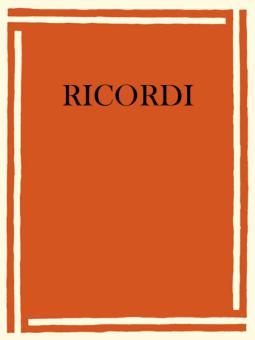Andrea Gabrieli
Concerti Vol. 11-IV

Andrea Gabrieli
Concerti Vol. 11-IV
- Compositor Andrea Gabrieli
- Serie UMPC Critical Editions
- Editor Elena Quaranta David Bryant
- Editorial Ricordi
- Nº de pedido NR14227100
IVA incluido.,
Más gastos de envío
No disponible en todos los países. Leer más
Descripción de la:
The first and only edition of the Concerti di Andrea, et di Gio: Gabrieli [...] continenti musica di chiesa, madrigali, et altro, per voci, et stromenti musicali, à 6. 7. 8. 10. 12. et 16 appeared in 1587, two years after Andrea’s death. The publisher was Angelo Gardano, the probable editor Giovanni Gabrieli. Vol. IV of this four-volume critical edition contains the largest of the secular works in the collection: eight madrigals in 8, 10 and 12 parts, and an 8-part instrumental ricercar. An Appendix features Erhard Bodenschatz’s 8-part arrangements (1603) of two 10- and 12-part motets (of which the originals are published in vol. II). The volume concludes with a comprehensive Critical Commentary (in Italian and English) for the entire collection. The music was undoubtedly conceived largely for festive use, though the events themselves can seldom be identified unequivocally: among the madrigals are an invitation to an unspecified banquet, a composition in praise of an unnamed “Sienese gentlewoman”, two homages to Henry of Valois (who, in 1574, passed through Venice en route from Poland to his coronation at Reims as king of France), a composition dedicated to the dedicatee of the print itself (Jakob Fugger), and a long, two-section madrigal “of the Battle”, presumably commissioned for the celebrations of the naval victory at Lepanto in 1571. This composition, a musical re-evocation of a battle complete with the “dobbe dob dobbe dob” of the drums and “fan farirari raron” of the trumpets on repeated notes, may represent an early approach by Gabrieli to the world of the theatrical representations sometimes staged in the Ducal Palace on special occasions. Cori spezzati technique, frequently found in the church music composed for St Mark’s, also appears in many of the 7-, 8-, 10- and 12-part madrigals, where it assumes a variety of forms in accordance with the nature of the poetic text and the functional destination of the music. Some madrigals have evidently dialogical structures, characterized by the use of different musical phrases for the different words pronounced by individual protagonists. Others, like the motets in the first part of the collection, are based on the exchange of essentially similar materials between the different choirs; the relatively long initial phases are gradually shortened, in such a way as the final tutti occurs after innumerable alternations, choral stretti and intermediate tutti. A special case regards the long text of Ecco Vinegia bella (in honour of Henry III), in which different text and music are assigned to the two groupings, prior to the long, 12-part tutti finale.
